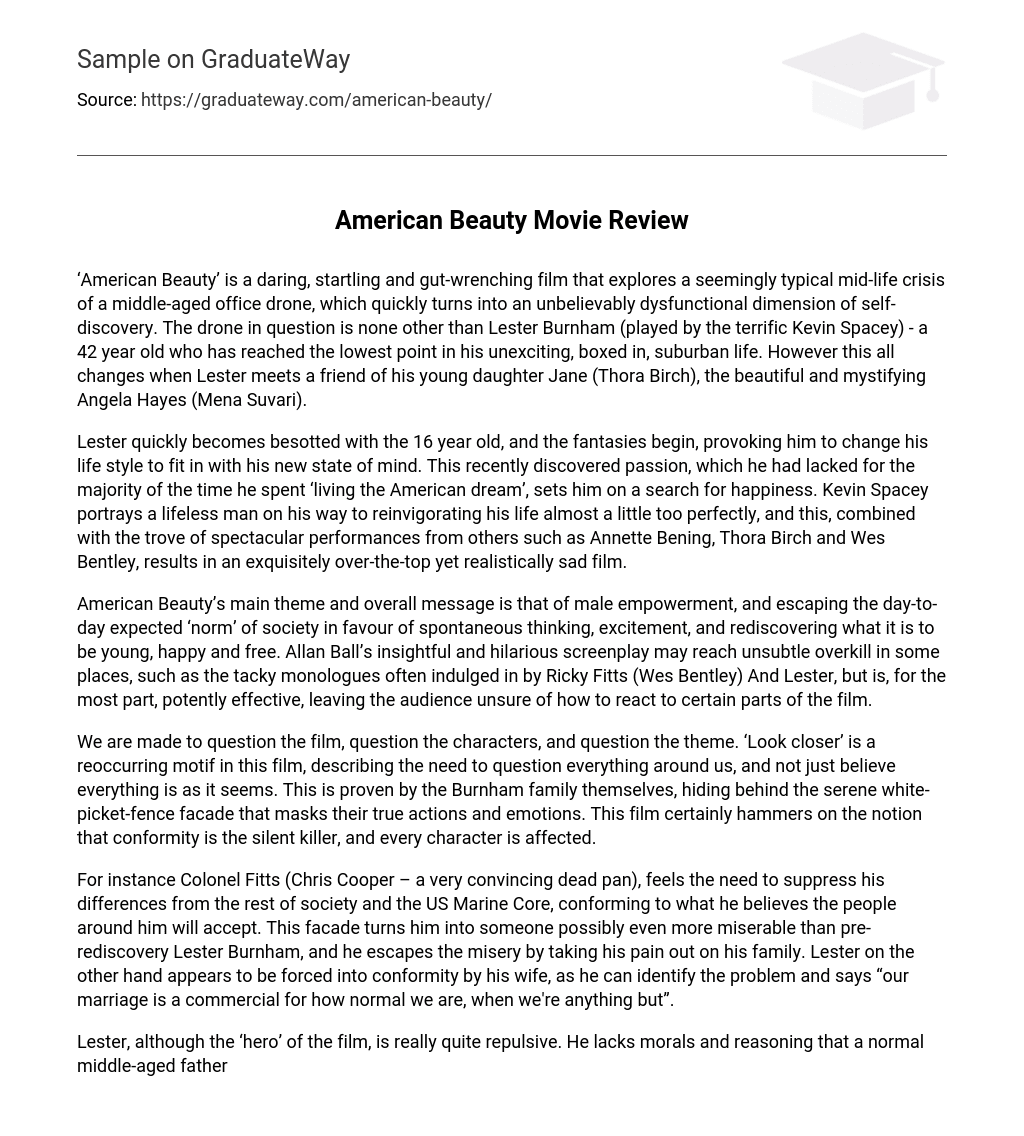‘American Beauty’ is a daring, startling and gut-wrenching film that explores a seemingly typical mid-life crisis of a middle-aged office drone, which quickly turns into an unbelievably dysfunctional dimension of self-discovery. The drone in question is none other than Lester Burnham (played by the terrific Kevin Spacey) – a 42 year old who has reached the lowest point in his unexciting, boxed in, suburban life. However this all changes when Lester meets a friend of his young daughter Jane (Thora Birch), the beautiful and mystifying Angela Hayes (Mena Suvari).
Lester quickly becomes besotted with the 16 year old, and the fantasies begin, provoking him to change his life style to fit in with his new state of mind. This recently discovered passion, which he had lacked for the majority of the time he spent ‘living the American dream’, sets him on a search for happiness. Kevin Spacey portrays a lifeless man on his way to reinvigorating his life almost a little too perfectly, and this, combined with the trove of spectacular performances from others such as Annette Bening, Thora Birch and Wes Bentley, results in an exquisitely over-the-top yet realistically sad film.
American Beauty’s main theme and overall message is that of male empowerment, and escaping the day-to-day expected ‘norm’ of society in favour of spontaneous thinking, excitement, and rediscovering what it is to be young, happy and free. Allan Ball’s insightful and hilarious screenplay may reach unsubtle overkill in some places, such as the tacky monologues often indulged in by Ricky Fitts (Wes Bentley) And Lester, but is, for the most part, potently effective, leaving the audience unsure of how to react to certain parts of the film.
We are made to question the film, question the characters, and question the theme. ‘Look closer’ is a reoccurring motif in this film, describing the need to question everything around us, and not just believe everything is as it seems. This is proven by the Burnham family themselves, hiding behind the serene white-picket-fence facade that masks their true actions and emotions. This film certainly hammers on the notion that conformity is the silent killer, and every character is affected.
For instance Colonel Fitts (Chris Cooper – a very convincing dead pan), feels the need to suppress his differences from the rest of society and the US Marine Core, conforming to what he believes the people around him will accept. This facade turns him into someone possibly even more miserable than pre-rediscovery Lester Burnham, and he escapes the misery by taking his pain out on his family. Lester on the other hand appears to be forced into conformity by his wife, as he can identify the problem and says “our marriage is a commercial for how normal we are, when we’re anything but”.
Lester, although the ‘hero’ of the film, is really quite repulsive. He lacks morals and reasoning that a normal middle-aged father would have, making him rather difficult to ‘like’ and relate with. He even confesses to thinking lowly of himself at one point, saying “Both my wife and daughter think I’m this gigantic loser, and they’re right. I have lost something. I didn’t always feel this sedated. ” However, we still feel a sort of admiration towards Lester’s journey to happiness, which does eventually break him out of his near-catatonic existence.
Mendes and the film’s cinematographer, Conrad L. Hall, managed to work some great shots into this movie. Close ups of Lester in the beginning shows him boxed in, be it by windows, desks or beds, he is almost always shown in the centre of a rigid square, symbolising the entrapment he faces caused by the material world he surrounds himself in. This film is full of close ups that show the character’s mind-sets at the time, as facial expression appears to be a key feature to the mood that the film is portraying.
As written freshly by Allan Ball (who makes a very attention grabbing film debut) American Beauty’s targets are characters that are not new, nor different to any other suburban characters seen in movies or television shows of the time, however it is the dialogue that truly makes the stereotypes in this film unforgettable. Ball has managed to incorporate a fair amount of sarcasm, noticed especially in Jane Burnham, who’s witty, sarcastic replies portray the tension and strained relationship that her and her father share. For example, ”So Janie, how was school? ‘ asks Lester, followed by Jane’s sarcasm: ”It was spectacular, Dad. ” Allan Ball’s script for this film is certainly exceptional. In all, ‘American Beauty’ is a film unlike any other, which combines incredible acting, cinematography and writing , creating a world not too different from our own, whether we are willing to accept that or not. The passion we see as the characters try viciously to escape their boring, rigid facades, sets the tone for the entire film, ending finally with Lester’s final act of pure happiness, staring at a picture of his





